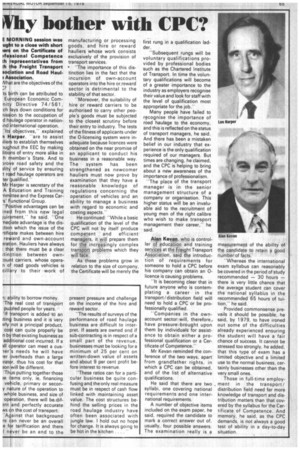y bother with CPC?
Page 67

If you've noticed an error in this article please click here to report it so we can fix it.
E ORNING session was ug t to a close with short ler on the Certificate of ife sional Competence th epresentatives from th he Freight Transport sos.iation and Road Haul, A sociation.
Nh t are the objectives of the ts irth can be attributed to European Economic Corn nit Directive 74 /561,
ch ays down conditions for is -ion to the occupation of d h ulage operator in nationInd nternational operation.
'It objectives," explained arper, ''are to assist ilie to establish themselves )ug out the EEC by making liti ns of entry more alike in h ember's State. And to )ro e road safety and the 314 of service by ensuring t r d haulage operators are ter ualified."
Mr arper is secretary of the A ducation and Training -rim ttee and the Express Cars unctional Group.
"P sitive advantages can be Ine from this new legal iuir merit,he said. "One Tie late advantage is the disnio which the issue of the -tifi ate makes between hire re ard and own-account arat on. Hauliers have always th t there must be a clear ;tin tion between own;ou t carriers, whose operan o road goods vehicles is cill ry to their work of
manufacturing or processing goods, and hire or reward hauliers whose work consists exclusively of the provision of transport services.
-The importance of this distinction lies in the fact that the incursion of own-account operators into the hire or.reward sector is detrimental to the stability of that sector.
-Moreover, the suitability of hire or reward carriers to be authorised to carry other people's goods must be subjected to the closest scrutiny before their entry to industry. The tests of the fitness of applicants under the 0-licensing system were inadequate because licences were obtained on the near promise of an applicant to conduct his business in a reasonable way. The system has been strengthened as newcomer hauliers must now prove by examination that they have a reasonable knowledge of regulations concerning the operation of vehicles and an ability to manage a business with regard to economic and costing aspects.
He continued: "While a basic qualification of the level of the CPC will not by itself produce competent and efficient managers, it will prepare them for the increasingly complex transport problems which they will face.
As these problems grow in relation to the size of company, the Certificate will be merely the first rung in a qualification ladder.
"Subsequent rungs will be voluntary qualifications provided by professional bodies such as the Chartered Institute of Transport. In time the voluntary qualifications will become of a greater importance to the industry as employers recognise their value and look for staff with the level of qualification most appropriate for the job."
Many people have failed to recognise the importance of road haulage to the economy, and this is reflected on the status of transport managers, he said. And there has been a mistaken belief in our industry that experience is the only qualification required of our managers. But times are changing, he claimed, and the CPC is helping to bring about a new awareness of the importance of professionalism.
"The place of the transport manager is in the senior management structure of a company or organisation. This higher status will be an invaluable aid to the recruitment of young men of the right calibre who wish to make transport management their career," he said.
Alan Kevan, who is controller of education and training services at the Freight Transport Association, said the introduc tion of requirements for someone to hold a CPC before his company can obtain an 0licence is causing problems.
"It is becoming clear that in future anyone who is contem plating a career in the transport/distribution field will need to hold a CPC or be professionally qualified.
"Companies in the ownaccount sector will, therefore,, have pressure brought upon them by individuals for assistance to obtain either a professional qualification or a Certificate of Competence."
Mr Kevan reminded the conference of the two ways, apart' from grandfather rights, in which a CPC can be obtained, and of the list of alternative qualifications.
He said that there are two syllabi, one covering national requirements and one international requirements.
A number of objective items included on the exam paper, he said, required the candidate to mark a correct answer out of, usually, four possible answers. The examination really is a measurement of the ability of the candidate to retain a good number of facts.
"Whereas the international exam syllabus can reasonably be covered in the period of study recommended — 30 hours — there is very little chance that the average student can cover the national syllabus in the recommended 65 hours of tuition," he said.
Provided commonsense prevails it should be possible, he said, by 1979, to have ironed out some of the difficulties already experienced ensuring the student will have a fair chance of success. It cannot be stressed too strongly, he added, that this type of exam has a limited objective and a limited use to the normal business, certainly businesses other than the very small ones.
Those in full-time employment in the transport/ distribution field need far more knowledge of transport and distribution matters than that covered by the syllabus for the Certificate of Competence. And memory, he said, as the CPC demands, is not always a good test of ability in a day-to-day situation.




























































































































